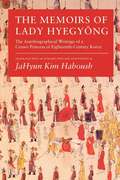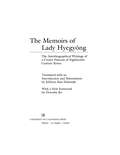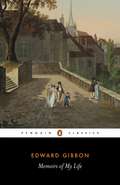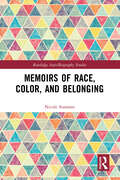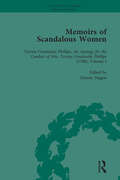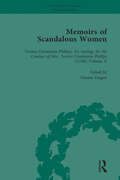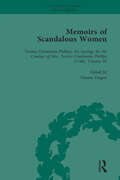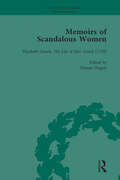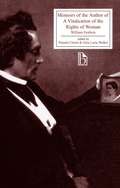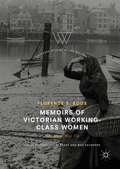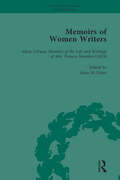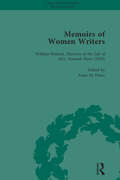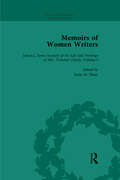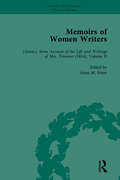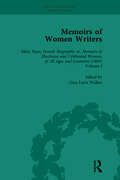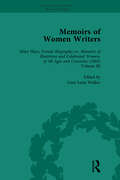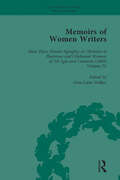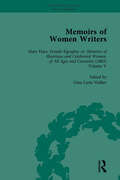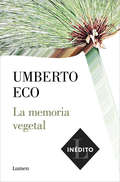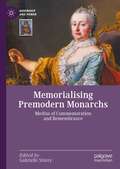- Table View
- List View
The Memoirs of Lady Hyegyong: The Autobiographical Writings of a Crown Princess of Eighteenth-century Korea
by Jahyun Kim HaboushLady Hyegyong's memoirs, which recount the chilling murder of her husband by his father, is one of the best known and most popular classics of Korean literature. From 1795 until 1805 Lady Hyegyong composed this masterpiece, which depicts a court life whose drama and pathos is of Shakespearean proportions. Presented in its social, cultural, and historical contexts, this first complete English translation opens a door into a world teeming with conflicting passions, political intrigue, and the daily preoccupations of a deeply intelligent and articulate woman. JaHyun Kim Haboush's accurate, fluid translation captures the intimate and expressive voice of this consummate storyteller. The Memoirs of Lady Hyegyong is a unique exploration of Korean selfhood and of how the genre of autobiography fared in premodern times.
The Memoirs of Lady Hyegyong: The Autobiographical Writings of a Crown Princess of Eighteenth-century Korea
by Dorothy Ko Jahyun Kim HaboushLady Hyegyong's memoirs, which recount the chilling murder of her husband by his father, form one of the best known and most popular classics of Korean literature. From 1795 until 1805 Lady Hyegyong composed this masterpiece, depicting a court life Shakepearean in its pathos, drama, and grandeur. Presented in its social, cultural, and historical contexts, this first complete English translation opens a door into a world teeming with conflicting passions, political intrigue, and the daily preoccupations of a deeply intelligent and articulate woman. <P> JaHyun Kim Haboush's accurate, fluid translation captures the intimate and expressive voice of this consummate storyteller. Reissued nearly twenty years after its initial publication with a new foreword by Dorothy Ko, The Memoirs of Lady Hyegyong is a unique exploration of Korean selfhood and an extraordinary example of autobiography in the premodern era.
Memoirs of My Life
by Edward GibbonEdward Gibbon was one of the world's greatest historians and a towering figure of his age. When he died in 1794 he left behind the unfinished drafts of his Memoirs, which were posthumously edited by his friend Lord Sheffield, and remain an astonishing portrait of a rich, full life. Recounting Gibbon's sickly childhood in London, his disappointment with an Oxford 'steeped in port and prejudice', his successful years in Lausanne, his first and only love affair and the monolithic achievement of The Decline and Fall of the Roman Empire, he distils his genius for history into a remarkable gift for autobiography. Candid and detailed, these writings are filled with warmth and intellectual passion.
Memoirs of Race, Color, and Belonging (Routledge Auto/Biography Studies)
by Nicole StamantMemoirs of Race, Color, and Belonging provides a fresh look at the complex dialogue of race and identity in memoir, examining three generations of biracial African Americans’ experiences in their autobiographies. Exploring writers from James McBride and Shirlee Taylor Haizlip to Barack Obama, Toi Dericotte, Natasha Trethway, Rebecca Walker, and Emily Raboteau, this volume explores the ways in which these memoirists refute terms regarding race and simple understandings of belonging, using their contested embodied positions as sites for narration, quest, and protest. Organized chronologically, this volume will provide readers insight into memoirs from Jim Crow America to the Civil Rights period and finally those considering the post-soul (and post-Loving v. Virginia) generation. Memoirs of Race, Color, and Belonging interrogates these difficult spaces surrounding identity construction, encouraging new conversations surrounding visibility of mixed-race individuals and experiences for future generations. Through archives and personal testimony, this book provides a model for interweaving theoretical and personal accounts of color in American culture to encourage discussions that transgress disciplinary boundaries in the today’s dialogue.
Memoirs of Scandalous Women, Volume 1
by Dianne DugawThese memoirs all come from women forced to live lives of impropriety, often after ill-treatment from unscrupulous men. Their tales of survival in the face of extreme hardship and privations make inspirational and compelling reading.
Memoirs of Scandalous Women, Volume 2
by Dianne DugawThese memoirs all come from women forced to live lives of impropriety, often after ill-treatment from unscrupulous men. Their tales of survival in the face of extreme hardship and privations make inspirational and compelling reading.
Memoirs of Scandalous Women, Volume 3
by Dianne DugawThese memoirs all come from women forced to live lives of impropriety, often after ill-treatment from unscrupulous men. Their tales of survival in the face of extreme hardship and privations make inspirational and compelling reading.
Memoirs of Scandalous Women, Volume 4
by Dianne DugawThese memoirs all come from women forced to live lives of impropriety, often after ill-treatment from unscrupulous men. Their tales of survival in the face of extreme hardship and privations make inspirational and compelling reading.
Memoirs of Scandalous Women, Volume 5
by Dianne DugawThese memoirs all come from women forced to live lives of impropriety, often after ill-treatment from unscrupulous men. Their tales of survival in the face of extreme hardship and privations make inspirational and compelling reading.
Memoirs of the Author of A Vindication of the Rights of Woman
by William GodwinGodwin worked with Mary Wollstonecraft Shelley at the turn of the 19th century to advocate for social progress. In these, his memoirs, he reflects on that work as well as his and Shelley's various other passions. The work here was severely criticized at the time and long unavailable. Here, Clemit and Walker provide context, explication, and an introduction to Godwin's memoir.
Memoirs of Victorian Working-Class Women
by Florence S. BoosThis volume is the first to identify a significant body of life narratives by working-class women and to demonstrate their inherent literary significance. Placing each memoir within its generic, historical, and biographical context, this book traces the shifts in such writings over time, examines the circumstances which enabled working-class women authors to publish their life stories, and places these memoirs within a wider autobiographical tradition. Additionally, Memoirs of Victorian Working-Class Women enables readers to appreciate the clear-sightedness, directness, and poignancy of these works.
Memoirs of Women Writers, Part I, Volume 1
by Anna M Fitzer Gina Luria WalkerThis volume is a review of the autobiographical account Alicia LeFanu, Memoirs of the Life and Writings of Mrs. Frances Sheridan, which sheds light on the controversial role of the female writers in the early nineteenth century.
Memoirs of Women Writers, Part I, Volume 2
by Anna M Fitzer Gina Luria WalkerThis book is about Mrs. Hannah More, who had acted as a controversial patron to Ann Yearsley, and had used her own reputation as a poet in support of the abolitionist cause. It is the collaborative effort of Roberts, Bickersteth and Seeley that testifies the complexity of her enduring influence.
Memoirs of Women Writers, Part I, Volume 3
by Anna M Fitzer Gina Luria WalkerThis book is about Mrs. Sarah Trimmer and her charitable work. It is a principal source of reference for the work she undertook as an author, philanthropist and pioneer in the promotion and institution of educational opportunities for impoverished children in the early nineteenth century.
Memoirs of Women Writers, Part I, Volume 4
by Anna M Fitzer Gina Luria WalkerThis book is the second volume about Mrs. Sarah Trimmer and her charitable work. It contains selected content on her life and writings with original letters, her meditations and prayers for impoverished children in the early nineteenth century.
Memoirs of Women Writers, Part II, Volume 5
by Gina Luria WalkerThis book is fifth of the six-volume modern scholarly edition on the stories of real women's experiences. Written by the autodidact Mary Hays, it attests to the existence of active, learned and powerful women who produced new knowledge and made genuine contributions to cultural capital.
Memoirs of Women Writers, Part II, Volume 6
by Gina Luria WalkerThis book is second volume of Mary Hays's Female Biography; a scholarly edition on the stories of real women's experiences, such as those of Elizabeth Bland and Boadecia. It attests to the existence of active, learned and powerful women who produced new knowledge and contributed to cultural capital.
Memoirs of Women Writers, Part II, Volume 7
by Gina Luria WalkerThis volume is a review of the autobiographical account Mary Hays, Female Biography; or, Memoirs of Illustrious and Celebrated Women, of All Ages and Countries (1803), Volume III, which sheds light on the controversial role of the female writers in the early nineteenth century.
Memoirs of Women Writers, Part III vol 10
by Gina Luria WalkerMary Hays was a radical feminist whose writings brought her to the attention of her contemporaries William Blake, Thomas Paine, Mary Wollstonecraft and William Godwin. Her Female Biography is an ambitious and acclaimed work, covering the lives of 294 women.
Memoirs of Women Writers, Part III vol 8
by Gina Luria WalkerMary Hays was a radical feminist whose writings brought her to the attention of her contemporaries William Blake, Thomas Paine, Mary Wollstonecraft and William Godwin. Her Female Biography is an ambitious and acclaimed work, covering the lives of 294 women.
Memoirs of Women Writers, Part III vol 9
by Gina Luria WalkerMary Hays was a radical feminist whose writings brought her to the attention of her contemporaries William Blake, Thomas Paine, Mary Wollstonecraft and William Godwin. Her Female Biography is an ambitious and acclaimed work, covering the lives of 294 women.
La memoria vegetal
by Umberto EcoUMBERTO ECO INÉDITO Y VISIONARIO Un canto de amor a los libros y a su acumulación obsesiva, por «el escritor que cambió la cultura» (Corriere della Sera ) «Umberto Eco cambió nuestra mirada sobre los libros: imprescindibles, pequeños, frágiles, a veces criminales, casi siempre salvadores. Un maestro que nos enseñó a entrelazar la sabiduría y el juego con su estilo sagaz y lúdico, con su asombrosa inventiva y certera lucidez.»Irene Vallejo El libro es un seguro de vida, una pequeña anticipación de la inmortalidad. El cerebro humano cuenta, desde el principio de los tiempos, con una memoria orgánica y otra mineral, grabada en piedras y tabletas de arcilla. Junto a ellas, de forma paralela, se ha desarrollado otra más profunda, silenciosa y revolucionaria: la memoria vegetal, impresa en papiros y en trapos hasta llegar al papel procedente del árbol que conocemos hoy. Su instrumento de supervivencia es el libro, objeto de amor y devoción durante siglos.Umberto Eco, el «humanista integral», según Fernando Savater, dedica estos textos inéditos e iluminadores a los bibliófilos como él, a los futuros bibliófilos y a los que todavía no saben que lo son. Un libro para aprender, deslumbrarse, emocionarse y seguir leyendo siempre. La crítica ha dicho...«Un pequeño volumen íntimo y precioso. Un viaje ligero y divertido, que va desde el nacimiento del papel hasta el libro electrónico, con títulos irónicos y bajo la bandera de la digresión y del divertissement literario.»Silvia Bignami, La Repubblica «La figura de Umberto Eco es tanto mayor cuanto más tiempo pasa.»Vicente Verdú, El País «Allí donde Eco disparaba su inteligencia se hacía la luz.»Domingo Ródenas, El Periódico de Catalunya «Un genio inagotable, voraz, que construye y deconstruye sin cesar, de inteligencia deslumbrante y humorística cuando hace falta.»Mercedes Monmany, ABC «Uno de los pensadores más influyentes de nuestro tiempo.»Los Angeles Times «Una fiesta de la inteligencia, un placer de los sentidos y una inolvidable experiencia.»J. Ferrer, La Razón «Un gigantesco sabio a quien nada humano le era ajeno.»Miguel Lorenci, El Comercio «La literatura de Umberto Eco es un bombardeo indiscriminado que no respeta ningún protocolo de guerra.»El Cultural
Memorial de Aires
by Machado De AssisThe last novel by Brazil's most important writer, Memorial de Aires doesn't have a strict plot. It is structured as a kind of diarly of Counselor Aires, a retired diplomat. His notes tell several stories including that of Tristão, who falls in love with and marries a young widow, Fidália. After their marriage, the couple go to Europe, leaving their friends with only sadness and memories. Known as the novel that best reflects the personality and life of Machado de Assis, Memorial de Aires substitutes the irony and sarcasm of his earlier novels with a compassionate and melancholy tone. Some critics count the novel as a literary and human testament from the master of Brazilian letters.
Memorialising Premodern Monarchs: Medias of Commemoration and Remembrance (Queenship and Power)
by Gabrielle StoreyThis book examines the legacies and depictions of monarchs in an international context, focusing on both self-representation and commemoration by others. Spanning ancient India through to eighteenth-century Russia, this volume offers several case studies to demonstrate trends and patterns in how different societies chose to commemorate and remember their rulers in a variety of mediums. Contributions highlight several lesser known rulers, alongside more famous ones such as Henry VIII of England, to develop a deeper understanding of how memory and monarchy functioned when drawn together. Memorialising Premodern Monarchs brings to the fore the importance of memory and memorialisation when considering the legacies and records of past rulers and their societies, and allows a deeper reflection on how these rulers live on through the historical record and popular culture.
